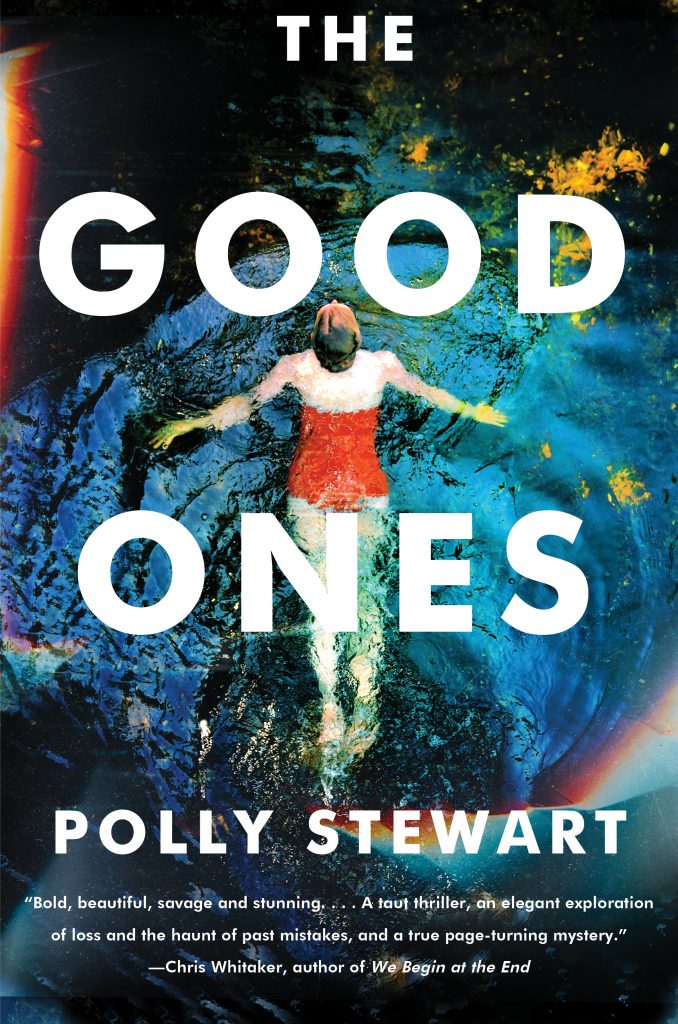In The Good Ones, Polly Stewart’s new novel of literary suspense, a woman’s family and friends struggle to find answers about her disappearance in a small Blue Ridge town. Set almost two decades after Lauren disappeared, leaving behind a bloodied washcloth and little more, the novel centers on her old friend, Nicola, the protagonist, who remains haunted by the loss and continues to try to make sense of what happened.
“I’ve always been most interested in unsolved disappearances,” Stewart says, “and I think it’s because of what the brain does when faced with a story without an ending—you try to work out a resolution for yourself, the same way we’re always trying to predict the ending of the story we’re reading before we get to it.”
After spending many years away, Nicola reluctantly returns to her small-town home to manage her own family matters, and long-hidden truths around Lauren’s unsolved case—and her problematic past—seem like they might finally be revealed. The Good Ones is a story of mothers and daughters, girlfriends and wives, and what it means to be “good” in any of those roles—and what the consequences may be for failing to do so.
“Writing ‘bad’ women, and in particular bad mothers, is always difficult for me, but I also think it’s really important,” Stewart says. “We hear so much now about whether women in literature need to be likable. … I love reading about women pushing the boundaries of what’s seen as acceptable, and in my own work, I try to let the women in my books take full advantage of their agency, even if that means making choices that some people might think of as negative or destructive.”

Growing up in Radford, Virginia, and attending Hollins University before venturing elsewhere to eventually earn her Ph.D. in British literature in St. Louis, Missouri, Stewart now teaches creative writing at Virginia Military Institute and hosts The Craft of Crime Fiction interview series. Her debut novel, Wild Girls—written under her legal name, Mary Stewart Atwell—also explored themes of female friendship and the longing to escape small-town life, both of which are aspects of her own life that she grapples with in her fiction.
“When I was growing up, I couldn’t wait to get out of the small town I grew up in,” says Stewart. “I was truly shocked by how much I missed the Blue Ridge when I moved away. I felt an almost physical longing for the landscape here, the feel of the air, the particular rhythm of the seasons. I’ve known people who grew up in beautiful places who don’t feel this at all, so it’s definitely not a universal phenomenon, but I’ve had to accept that I wouldn’t be happy living anywhere else.”
For Virginia readers, the connection jumps off the page, with descriptions of tubing on the river, watching local news, attending the big football game, and exploring abandoned houses, among other aspects of the day-to-day, that perfectly conjure regional small-town life. Still, it’s not all rose-colored nostalgia, as Stewart says, “At the same time, there are problematic aspects of Southern culture that I wanted to explore here, particularly white Southern masculinity.”
This particular form of masculinity shows up in a number of ways throughout the novel, and is not without psychological and physical violence. Through these interactions and dynamics, Stewart explores questions of power, gender, and sexual control while maintaining a focus on agency and empathy for survivors.
Further, she reflects, “As I got to know the characters, I realized that their private and public selves diverged quite a bit, and I was interested in exploring that as a theme. It probably comes back to that question of what is and isn’t seen as socially acceptable for women: so many of us still internalize taboos when it comes to talking about sex and voicing desire, and I found that those questions played themselves out over the course of the novel.”
Though typically a planning-oriented writer—“I have the book I’m working on right now outlined on note cards on a giant bulletin board in my office”—Stewart found that that method did not work for these characters and the questions they explore in The Good Ones. She recalls, “I had Nicola’s voice from the beginning, and I knew the basic facts of Lauren’s disappearance, but nearly everything else came together through a process of writing, failing, and writing again.”
In line with that process, the novel’s most interesting theme is perhaps its exploration of how our past selves may influence who we become and whether it is possible to change, or to write our own ending. “For me, the realization that the possibilities for changing my life are pretty limited has come with a commensurate longing to live different lives and be different people,” says Stewart. “Luckily, because I’m a writer, I get to explore that longing through fiction rather than through a midlife crisis.”
